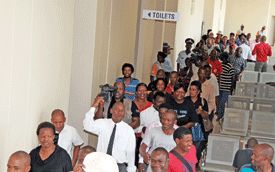Workers lose another battle with govt
OARABILE MOSIKARE
Staff Writer
| Thursday March 21, 2013 00:00


Delivering a 100-page judgment, Court of Appeal Judge President Ian Kirby said the process adopted by the Directorate of Public Service Management (DPSM), and the dismissals in all circumstances had been fair and in compliance with rules of natural justice. This appeal centred around the applicability of the audi alteram partem rule ('hear the alternative party too') in a strike situation, the special case of ESEs and the rule of law. Justice Kirby observed that strikes are not a common occurrence in Botswana. 'We have no 'strike season', and violence and destruction to property during industrial action is almost unknown,' he said.
'Generally industrial relations are good, with mutually acceptable salary increases being sensibly negotiated from time to time, both in the private sector and the public sector.' 'This was expected in a country that had enjoyed peace and stability for more than 45 years since independence,' he noted.He added that the public service, which was the backbone of the administration, enjoyed a well-earned reputation for diligence and discipline, which was difficult to match in the region.'Botswana is also a country in which the rule of law is universally respected,' the judge continued. 'Court orders are to be obeyed, promptly and without debate, as every Motswana knows.
'Disagreement can be debated later, in an appeal. No exception is made in the case of strikers or their unions.Against that background, the public service general strike - the first in Botswana's history - came at an unpropitious time. 'Public officers had not a rise in salary for a considerable period, and the cost of living had risen steadily. But this coincided with a worldwide recession from which Botswana was not immune. Diamond sales had slumped and there were severe budgetary constraints. This made salary negotiations extremely difficult.'
In Justice Kirby's view, all employees in an essential service play an important role individually towards ensuring the effectiveness of the team delivery of the essential service in question. 'Along with doctors, nurses and other specialists, the support staff, caterers, groundsmen, cooks and others ensure a hygienic, safe, and healthy environment conducive to the effective delivery of the service and to the health and swift recovery of patients,' he said. 'In a remote rural setting in particular, as is well known, groundsmen, nightwatchmen and the like are frequently called upon to perform vital roles to the nurses who man the clinics. The role of none of these should be downplayed, or reduced in its dignity, to the status of a non-essential or disposable component of the team.' He then upheld the appeal and said the four applicants pay costs jointly and severally.
